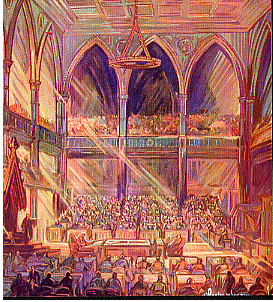
|
|
| Date Published: |
L’Encyclopédie de l’histoire du Québec / The Quebec History Encyclopedia
Confederation
Confederation, or Federation. In popular speech and writing, confederation is the designation applied to the federation of the provinces of Canada. The derivation of the word conveys the idea of an intimate union or alliance, rather than a definite constitution. As a political term, it was familiar to statesmen through the confederation of the Rhine, the articles of confederation (from 1777 onwards) which united the revolting English colonies, and the confederacy of the eleven states which seceded from the American union in 1860. This usage probably influenced the employment of the word during the Canadian movement and since. But the first resolution adopted by the Quebec conference in 1864 speaks of a federal union, and this phraseology also appears in the British North America Act. Writers on constitutions and jurisprudence differ on the question whether Canada is a true federation, although the conventions of the Canadian constitution and the decisions of the highest courts favour the view that federation, both technically and in practice, correctly describes the result. The argument advanced by John A. Macdonald in parliament, laying stress upon the giving of the residuum of power to the Dominion and not to the provinces, appears to show that the kind of union he had in mind was in reality a federation: "We thereby strengthen the central parliament and make the confederation one people and one government, instead of five peoples and five governments with merely a point of authority connecting us to a limited and insufficient extent."
First meeting of the Canadian Parliament in 1867
Source : W. Stewart WALLACE, ed., The Encyclopedia of Canada, Vol. II, Toronto, University Associates of Canada, 1948, 411p., pp. 114-115.
|
© 2005
Claude Bélanger, Marianopolis College |
|
